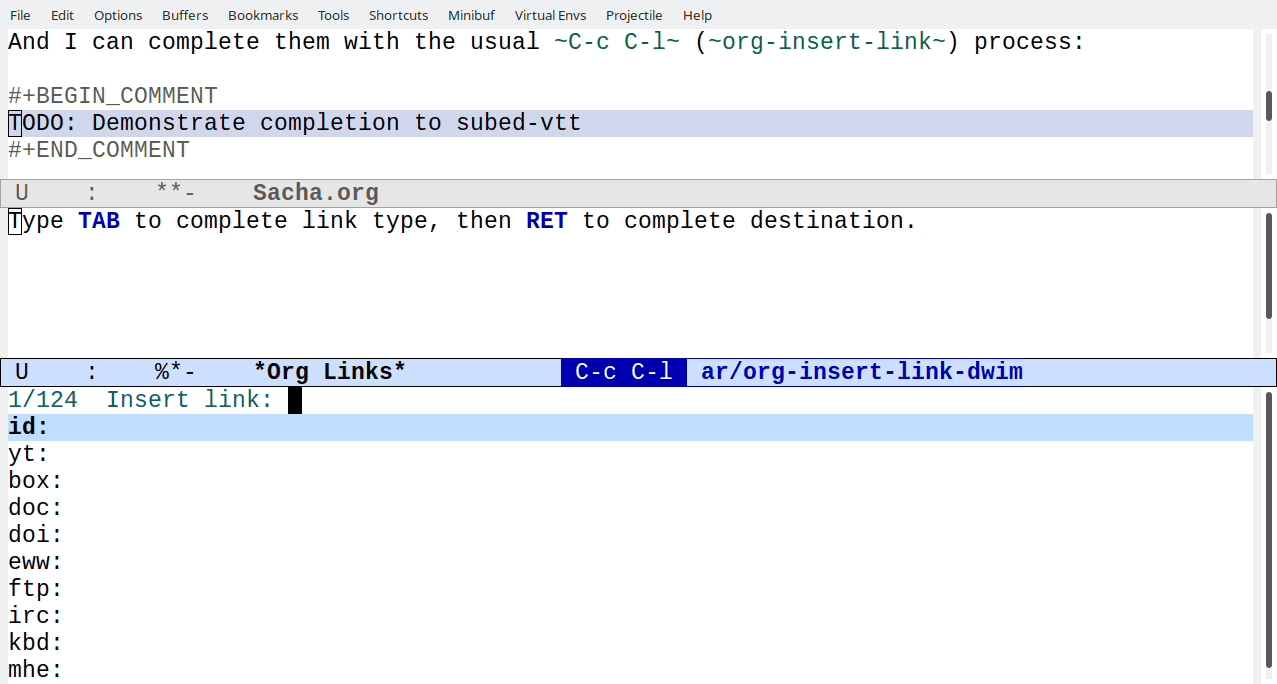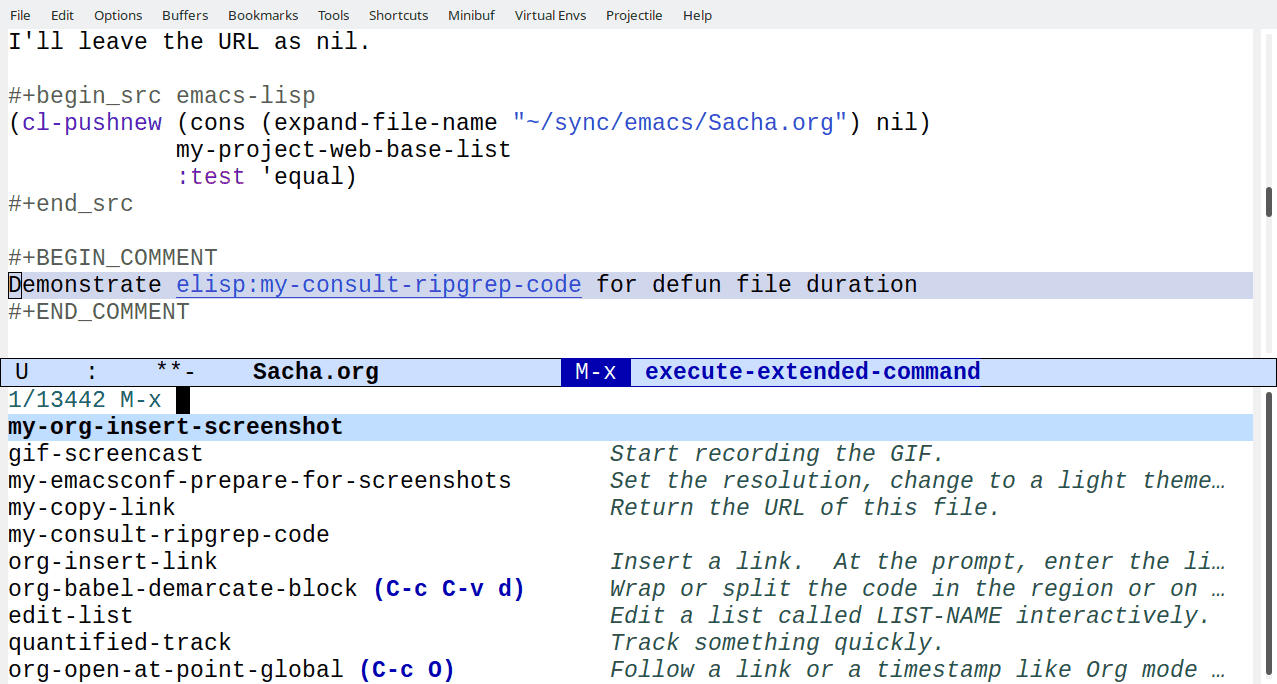Archiving public toots on my blog
| mastodon, emacs, orgI want to compile my global microblog posts into weekly posts so that they're archived on my blog. It might make sense to make them list items so that I can move them around easily.
my-mastodon-insert-my-statuses-since
(defun my-mastodon-insert-my-statuses-since (date) (interactive (list (org-read-date "Since date: "))) (insert (format "#+begin_toot_archive\n%s\n#+end_toot_archive\n" (mapconcat (lambda (o) (format "- %s\n #+begin_quote\n #+begin_export html\n%s\n #+end_export\n #+end_quote\n\n" (org-link-make-string (assoc-default 'url o) (assoc-default 'created_at o)) (org-ascii--indent-string (assoc-default 'content o) 2)) ;; (format "#+begin_quote\n#+begin_export html\n%s\n#+end_export\n#+end_quote\n\n%s\n\n" ;; (assoc-default 'content o) ;; (org-link-make-string (assoc-default 'url o) (assoc-default 'created_at o))) ) (seq-filter (lambda (o) (string= (assoc-default 'visibility o) "public")) (my-mastodon-fetch-posts-after (format "accounts/%s/statuses?count=40&exclude_reblogs=t&exclude_replies=t" (mastodon-auth--get-account-id)) date)) ""))))
Here's a little thing I used to convert a two-level list into my collapsible sections:
my-org-convert-list-to-collapsible-details
(defun my-org-convert-list-to-collapsible-details () (interactive) (let ((list (org-list-to-lisp t))) (mapc (lambda (o) (when (stringp (car o)) (insert (format "#+begin_my_details %s :open t\n%s#+end_my_details\n" (car o) (mapconcat (lambda (s) (concat "- " (string-trim (org-ascii--indent-string (car s) 2)) "\n")) (cdr (cadr o))))))) (cdr list))))
And here are my toots from the past week, roughly categorized into collapsible sections:
EmacsConf
2024-09-17T21:55:39.065Z CFP, draft schedule
The #EmacsConf call for proposals (https://emacsconf.org/2024/cfp/) target date is this Friday (Sept 20), so I've started drafting the schedule. Thanks to my SVG schedule visualization code and function for checking availability constraints from last year ( https://sachachua.com/blog/2023/09/emacsconf-backstage-scheduling-with-svgs/), it took only about an hour to sketch this out: https://emacsconf.org/2024/organizers-notebook/#draft-schedule . We can run two tracks simultaneously and I can also slightly reduce the buffer between talks, so there's plenty of space for more #Emacs talks if people want to propose them or nudge people to propose them. =)
2024-09-15T17:07:41.935Z diversity
I feel complicated feelings about #EmacsConf and diversity. On one hand, yes, I would love to have a mix of speakers that reflects the mix of interesting stories and people I come across in the #Emacs community. (I wouldn't get rid of or discourage anyone; I just want more! :) )
On the other hand, preparing and giving a presentation is a lot of work, and I have first-hand appreciation of how difficult it can be to find time to think - much less predict a specific time to have a conversation. (I'm only just beginning to be able to have some thinking time that isn't accompanied by the guilt of letting my kiddo binge-watch YouTube videos or the uncertainties of sacrificing my sleep, and I still rarely schedule anything for myself.)
In addition, there are little risks that other people might not even have on their radar. All it takes is one person developing a parasocial relationship or fixation, or someone getting grumpy about someone's pronouns or personal characteristics or opinions, and then deciding to go and ruin someone's day (or life)... I'd hate to encourage someone to put themselves out there and end up with that happening to them, even if it's not at all their fault or mine.
So yeah, it's a little hard for me to reach out. I can deal with impostor syndrome making people feel like they might not have much to say (share what you're learning! We're all figuring things out together), but I'm not so sure about the other concerns. While I'd like to think that in the Emacs community we often have a convivial atmosphere, sometimes it gets weird here too.
I'm not sure what to do here aside from thinking out loud. I wish I could wave a magic wand and solve some structural issues that could make things more equitable, but that's waaay above my paygrade. I can keep working on figuring out how to make use of fragmented time, and maybe that will help other people too. I like working on the captions for EmacsConf; they help me a lot, too. I can experiment with workflows for sharing what I'm learning in a way that doesn't require a lot of focus time, speech fluency (I occasionally stutter and have to redo things), or a powerful computer. (Emacs is totally my nonlinear video editor.) I can make an indirect request for more people to consider proposing a talk for https://emacsconf.org/2024/cfp/ (target date is Sept 20, but I think the other organizers are considering extending it too), even with all the caveats my anxious brain suggests. (I know, I'm terrible at sales. :) ) And really, EmacsConf isn't important in the grand scheme of things, it's just a fun excuse to get together and connect with other people who like this stuff too. :)
I wonder how this can be better. Thoughts?
Emacs
2024-09-17T15:07:41.153Z consult-omni
All right, I just got consult-omni and a Google custom search JSON API key set up so that I can call consult-omni-google, type keywords, pick the correct match, and insert it as an Org Mode link (or linkify the current region). I can think of more tweaks (embark-act on the current word or region to linkify it), but this is already pretty neat.
2024-09-16T14:05:06.263Z - user-init-file
Is there already an interactive #emacs command for opening user-init-file? I think that could be handy for newbies if we could just tell them to use "M-x visit-user-init-file" or even "Select 'Open init file' from the menu", although I suppose by the time we ask them to fiddle with the init file to add stuff to it, it's fine to encourage them to be comfortable with C-h v user-init-file and then maybe even teach them about M-x ffap at that point. Hmm...
2024-09-16T13:51:12.091Z - casual-symbol-overlay
Trying out casual-symbol-overlay (http://yummymelon.com/devnull/announcing-casual-symbol-overlay.html) by hooking it into embark-act, which I've bound to `C-.`:
```emacs-lisp
(use-package casual-symbol-overlay
:if my-laptop-p
:init
(with-eval-after-load 'embark
(keymap-set embark-symbol-map "z" #'casual-symbol-overlay-tmenu)))
```2024-09-11T17:12:03.791Z no nested lists for Org Babel
TIL that #OrgMode Babel only takes the top level of nested lists passed in via :var (https://orgmode.org/manual/Environment-of-a-Code-Block.html - Note that only the top-level list items are passed along. Nested list items are ignored.) When I try the manual example on my computer, I do indeed get only the top-level list items, unlike the nested data from https://mail.gnu.org/archive/html/emacs-orgmode/2020-10/msg00536.html . Of course, now that makes me want nested lists for both input and output...
Mastodon
2024-09-16T16:54:50.020Z access token generator
Both https://github.com/edsu/feediverse and https://github.com/Wikinaut/better_feediverse gave me "Invalid user name, password, or redirect_uris: ('Mastodon API returned error', 400, 'Bad Request', 'unsupported_grant_type')" when I tried to set it up with my GoToSocial instance. Fortunately, this access token generator worked: https://takahashim.github.io/mastodon-access-token/
2024-09-16T17:03:05.751Z feediverse
To get feediverse working, I also needed to edit my feediverse.py to add `version_check_mode='none'` to the Mastodon initialization, after `access_token`.
Moving to P52
2024-09-18T00:03:09.981Z WhisperX
Now that I have word-level timestamps from WhisperX (https://sachachua.com/blog/2024/09/using-whisperx-to-get-word-level-timestamps-for-audio-editing-with-emacs-and-subed-record/), I think I'll be able to write an elisp equivalent of the merging/splitting strategies of https://github.com/jianfch/stable-ts?tab=readme-ov-file#regrouping-words to merge subtitles considering gap, duration, length, and maximum number of words.
2024-09-15T17:08:17.757Z upgrade
(reposting, forgot to make it public)
I installed a 2TB Crucial T500 NVMe into my Lenovo P52 so that I can try dual-booting into Linux, since it was hard to figure out how I could get all my usual conveniences in WSL.
A preliminary test with a fresh Kubuntu install showed that my 11ty static blog generation takes about the same time as it does on the X230T, which is a little surprising considering the newer processor and the faster SSD, but maybe I'll have to look for speed gains elsewhere there. I think whisper.cpp is a lot more usable on this computer though, so I'm looking forward to taking advantage of that. The P52 might also make video editing possible, and it might support more modern monitors. It is a fair bit larger and heavier, though. I might end up still using both.
Anyway, I decided to redo the install by cloning my previous SSD. I want to see if I can skip the step of setting all those things up (although I'll need to redo the Syncthing config, of course). I don't have the extra parts that would let me install the 2.5" SSD from my X230T directly into the P52, but W- has a drive dock that works off USB 2.0. Slow and steady, but that's fine, I can run things overnight. I woke up today to find out that dd doesn't handle extended partitions and needs me to dd them one by one. That's cool, I'll just have that running in the background today.
If the clone doesn't work or if it's too much trouble to take the clone and give it its own identity, I'll probably wipe it and do another install. Since the X230T is on Kubuntu, I think I'll keep it on Kubuntu as well, to minimize the things I need to keep in my head as I switch between computers. My home directory is in a separate partition, so I can keep it if I want to try something different.
Now I just have to wait a few hours for these dd commands...2024-09-11T14:14:55.602Z static blog
My "plugins is not iterable" issue got fixed when I downgraded `@11ty/eleventy` from `@beta` to `@2.0.1`. Yay, that's one thing off my list!
Other tech stuff
2024-09-18T12:24:47.448Z Syncthing send only
I noticed that some of my #Syncthing folders were in Send Only mode, but I needed Send & Receive so that my Orgzly Revived changes would propagate back to my laptop. It turned out to be related to https://forum.syncthing.net/t/syncthing-readonly-access-on-storage/21459/2 . All I needed was to use the Syncthing web interface on my phone to edit the advanced options for those folders and set them back to Send & Receive.
2024-09-16T21:21:21.811Z Rails
Finally decided to invest some time into dusting off a Rails-based project and bringing it into modern times. I'm going to do step-wise upgrades from Ruby 2.1.10 and Rails 4.1.7 following https://www.fastruby.io/blog/rails/upgrade/rails-upgrade-series.html and https://www.fastruby.io/blog/ruby/rails/versions/compatibility-table.html . Thiiiis tempted to just ditch everything and start a Node/React/SQLite thing that I can import my data into instead.
Parenting
2024-09-17T12:28:29.082Z emotion check-in
I appreciate my kiddo's grade 3 teacher. =) She's currently doing the morning check-in of emotions (how's everyone feeling) using 9 images of Grogu with different facial expressions, which gets the kids (1) laughing, (2) interpreting facial expressions that aren't explicitly labeled, and (3) figuring out what they're feeling.
2024-09-12T12:50:02.014Z pull system
The kiddo is 8 and I'm developing a better understanding of what "fiercely independent" means. One of the things I'm working on learning is how to shut up and trust the process. =) I've started thinking of it like the pull system of Lean manufacturing principles. Things work out better when I wait for her to ask a question (to pull from me) because at that point, she's ready to hear the answer.
As it turns out, org-list-to-org uses the Org export mechanism, so it quietly discards things like #+begin_export html blocks. I decided to hard-code assumptions about the list's structure instead, which works for now.




